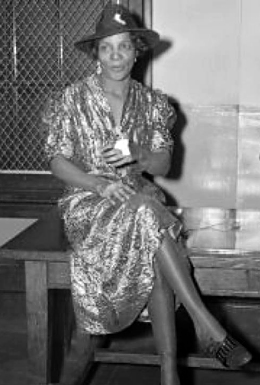By Samuetta Hill Drew | For the Birmingham Times

As we continue to explore African American women and their influence and impact on our daily lives the name Stephanie St. Clair named surfaced. It was an unlikely name because most of the women in the past articles were inventors with U.S. patents or the like, but this was a woman who had invented a system which didn’t require a patent. It required a sharp mind, a strong will and a strong understanding of the U.S. economic system.
St. Clair was a young woman born in Martinique, French Caribbean on Dec. 24, 1897. She was the daughter of a single mother named Felicienne who stories say worked very hard to send her daughter to school, but unfortunately, she died when Stephanie was 12 years old. This meant the end of her formal education, so St. Clair had to work.
She saved her money and moved to Montreal as a part of the 1910-1911 Caribbean Domestic Scheme, which brought domestic workers to Quebec. She soon migrated to the United States and continued this same profession of domestic work for whites in New York. She used her long voyage and subsequent quarantine to learn English. She was now fluent in French, Spanish and English. =
She fell in love with a small-time crook named Duke who was killed in a gang fight. She started working as a numbers runner in Harlem which was a male dominated operation with her new boyfriend Ed. The numbers game has been created by a man from the West Indies. She had made $30,000 and told Ed she wanted to leave him and start her own business. He tried to strangle her, and she pushed him away with such force that Ed fell hitting his head against a table and died.
She began employing her own men, bribed policemen, and on April 12, 1917, invested $10,000 of her own money in a clandestine lottery game in Harlem. She was the only woman in the numbers game. She was the first to use the telephone as a tool for clients to send in their numbers. As a result of running one of the most successful numbers games in the city, she became known throughout Manhattan as Quennie, but Harlem residents referred to her as Madame St. Clair. The movies Cotton Comes to Harlem and Hoodlum have a brief depiction of her.
Why Stephanie St. Clair?
As a reader, one may still be wondering why spotlight St. Clair? Well, let’s continue to look into her life’s story and why the numbers game popularity in Harlem influenced government lotteries.
St. Clair was involved in policy banking, which for her was a mixture of investing, gambling and playing the lottery. It was also a predominantly Black industry which allowed many bankers to have a sense of agency that would not be possible in white-dominated fields. In this way, St. Clair used the underground economy in Harlem to address racial politics.
Many banks at this time would not accept black customers, so they were not able to invest legally. Policy banking wasn’t technically legal, but it was one of the few options offered to Black Harlem residents who wished to invest their money. In addition Blacks couldn’t get loans from banks to open legitimate businesses in Harlem, so they used the numbers banker’s activity to finance their legal ventures. St. Clair helped the Black Harlem community also by providing many with jobs such as numbers runners. She made millions and lived a lavish lifestyle. She helped her community by donating money to programs that promoted racial progress.
She was known to put out ads in the local newspapers educating the Harlem community about their legal rights, advocating for voting rights and calling out police brutality against the Black community. She complained to senior police officers of harassment of Blacks in Harlem by police officers to no avail. St. Clair fought against the Mafia Leader Dutch Schultz push to take over the numbers game in Harlem. Schultz had begun killing and beating Black numbers runners. She was sentenced to eight months in a workhouse on trumped-up charges. Later in her life she retired from the numbers game, became a prosperous businesswoman and continued her fight for political reform. She died in 1969, shortly after her 73rd birthday.
As we end this article about St. Clair, it is important to quote a few sentences from the Journal of American History, Volume 101, Issue 1, June 2014 “A detailed study of the New York illegal numbers game conducted in 1972 revealed how high the stakes were in the conflict.
It described an industry with 24,000 employees and annual revenue of $600 million……While studying the fight over numbers gambling broadens our understanding of the ways key Black communities sought to position themselves during the 1960s and 1970s, it also deepens our knowledge of the modern origins of the widespread use of lotteries as tools of governance….The numbers game was the hinge upon which the national approach toward gambling pivoted…”




